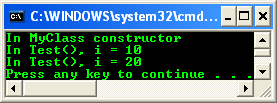< C++ .NET Arrays & Collections 12 | Main | C++ .NET Arrays & Collections 14 >
More On Arrays and Collections 13
What we have in this page?
The following code example copies a StringCollection to an array.
// SortedList.cpp : main project file. #include "stdafx.h"
#using <System.dll>
using namespace System; using namespace System::Collections; using namespace System::Collections::Specialized; void PrintValues( IEnumerable^ myCol );
int main(array<System::String ^> ^args) { // Creates and initializes a new StringCollection. StringCollection^ myCol = gcnew StringCollection; array<String^>^myArr = {"RED","orange","yellow","RED","green","blue","RED","indigo","violet","RED"}; myCol->AddRange(myArr); Console::WriteLine("Initial contents of the StringCollection:"); PrintValues(myCol); // Copies the collection to a new array starting at index 0. array<String^>^myArr2 = gcnew array<String^>(myCol->Count); Console::WriteLine("Copying, myCol to myArr2..."); myCol->CopyTo(myArr2, 0); Console::WriteLine("The new array contains:"); for (int i = 0; i < myArr2->Length; i++) { Console::WriteLine(" [{0}] {1}", i, myArr2[i]); } Console::WriteLine(); return 0; }
void PrintValues(IEnumerable^ myCol) { IEnumerator^ myEnum = myCol->GetEnumerator(); while (myEnum->MoveNext()) { Object^ obj = safe_cast<Object^>(myEnum->Current); Console::WriteLine(" {0}", obj); } Console::WriteLine(); }
Output:
|
Initial contents of the StringCollection:
RED
orange
yellow
RED
green
blue
RED
indigo
violet
RED
Copying, myCol to myArr2...
The new array contains:
[0] RED
[1] orange
[2] yellow
[3] RED
[4] green
[5] blue
[6] RED
[7] indigo
[8] violet
[9] RED
Press any key to continue . . .
The following code example searches the StringCollection for an element.
// SortedList.cpp : main project file.
#include "stdafx.h"
#using <System.dll>
using namespace System;
using namespace System::Collections;
using namespace System::Collections::Specialized;
void PrintValues(IEnumerable^ myCol);
int main(array<System::String ^> ^args)
{
// Creates and initializes a new StringCollection.
StringCollection^ myCol = gcnew StringCollection;
array<String^>^myArr = {"RED","orange","yellow","RED","green","blue","RED","indigo","violet","RED"};
myCol->AddRange(myArr);
Console::WriteLine("The contents of the StringCollection:");
PrintValues(myCol);
// Checks whether the collection contains "green" and if so, displays its index.
Console::WriteLine("Checking the content for \'green\' & \'pink\'");
Console::WriteLine();
if (myCol->Contains("green"))
Console::WriteLine("The collection contains \"green\" at index {0}.", myCol->IndexOf("green"));
else
Console::WriteLine("The collection does not contain \"green\".");
// Checks whether the collection contains "pink" and if so, displays its index.
if (myCol->Contains("pink"))
Console::WriteLine("The collection contains \"pink\" at index {0}.", myCol->IndexOf("pink"));
else
Console::WriteLine("The collection does not contain \"pink\".");
return 0;
}
void PrintValues(IEnumerable^ myCol)
{
IEnumerator^ myEnum = myCol->GetEnumerator();
while (myEnum->MoveNext())
{
Object^ obj = safe_cast<Object^>(myEnum->Current);
Console::WriteLine(" {0}", obj);
}
Console::WriteLine();
}
Output:

Supplementary Notes:
The ^ (Handle to Object on Managed Heap)
This new operator declares a handle to an object on the managed heap. A handle to an object on the managed heap points to the "whole" object, and not to a member of the object. In Visual C++ 2002 and Visual C++ 2003, __gc * was used to declare an object on the managed heap. The ^ replaces __gc * in the new syntax. The common language runtime maintains a separate heap on which it implements a precise, asynchronous, compacting garbage collection scheme. To work correctly, it must track all storage locations that can point into this heap at runtime. ^ provides a handle through which the garbage collector can track a reference to an object on the managed heap, thereby being able to update it whenever that object is moved. Because regular C++ pointers (*) and references (&) cannot be tracked precisely, a handle-to object declarator is used. Member selection through a handle (^) uses the pointer-to-member operator (->). The following example shows how to create an instance of reference type on the managed heap. This sample also shows that you can initialize one handle with another, resulting in two references to same object on managed, garbage-collected heap. Notice that assigning nullptr to one handle does not mark the object for garbage collection.
// The ^ handle, main project file.
#include "stdafx.h"
using namespace System;
ref class MyClass
{
public:
MyClass() : i(){Console::WriteLine("In MyClass constructor");}
int i;
void Test()
{
i = i + 10;
System::Console::WriteLine("In Test(), i = {0}", i);
}
};
int main(array<System::String ^> ^args)
{
// new object on the heap
MyClass ^ p_MyClass = gcnew MyClass;
// First function call...
p_MyClass->Test();
// another object of type MyClass...
MyClass ^ p_MyClass2;
// object assignment...
p_MyClass2 = p_MyClass;
// using nullptr instead of null...
p_MyClass = nullptr;
// second function call
p_MyClass2->Test();
return 0;
}
Output:

Part 1 | Part 2 | part 3 | Part 4 | Part 5 | Part 6